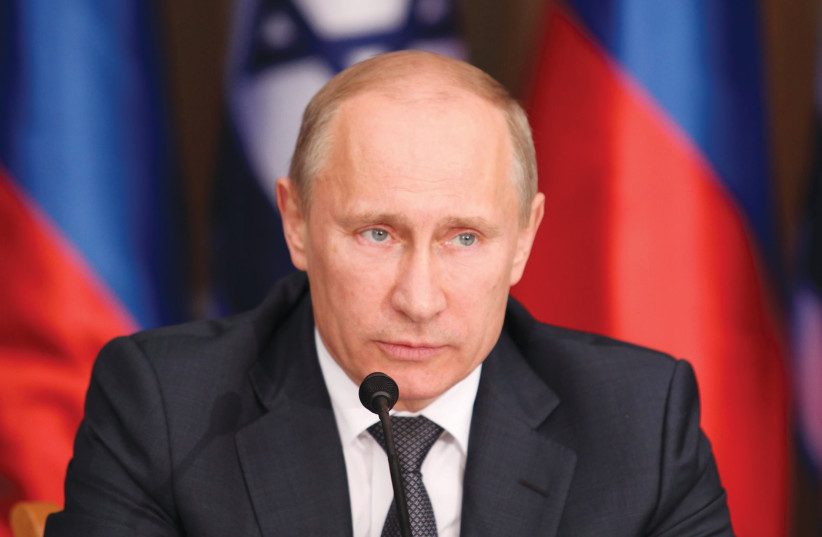Israeli relations with Russia have always been tricky.
The revolution after the Cold War, which remained true during Israel’s recent MABAM “war between the wars” campaign in Syria, was for Israel to forge certain strategic agreements with Moscow, even as Jerusalem mainly remains part of a bloc with the West.
That is why this past weekend’s report from Yediot Ahronot, that Israel had “warned” Russia about social media influence campaigns relating to the judicial reform debate was so shocking.
Everything regarding Israel’s handling of Russia in recent years has been handled with extreme sensitivity to Russian President Vladimir Putin’s honor and interests.
Primarily, Israel has been worried about whether the Russian military’s presence in Syria could circumscribe the IDF’s aerial strikes on Iran’s proxies in that country.

Is Israel afraid of Russia?
Israel has also worried about the possibility that Putin could provide the Islamic Republic with new nuclear know-how or guidance as well as conventional weapons and defenses – whether the Su-35 aircraft or the S-400 anti-aircraft missile system.
Jerusalem has taken repeated hits from its Western allies for avoiding supporting Ukraine to the same degree as the rest of the Western alliance, in order to placate Putin.
Whenever there was any new development that might even possibly disrupt the “deconfliction mechanism” that Israel and Russia agreed to so that the IAF can hit Iranian proxies in Syria, while meticulously avoiding Russians, Israel’s prime minister or another top official raced to Moscow to provide Putin with whatever reassurances he needed.
Add to all of this that Russia, after all of its failures in Ukraine, is tied with the US as the world’s top nuclear power and with an armed force that dwarfs Israel’s in size, and the obvious question becomes: since when would Israel have the audacity to “warn” Putin about anything?
Respectfully request, beg – for sure. But “warn” sounded like maybe Israel was forgetting that it is only a powerhouse compared to other Middle East countries, not compared to global powers like the US, Russia, and China.
First, The Jerusalem Post spoke to the author of the Yediot report, Nadav Eyal, who said that he would not translate what occurred as a “warning” as much as defining it as “an aggressive message.”
Second, while guarding his sources, Eyal noted that the sources were within the Israeli intelligence community. He pointed out that the two intelligence communities do not have the same ongoing relations the way that Jerusalem and Moscow’s diplomat and military class communicate regularly.
Incidentally, the Prime Minister’s Office, the Foreign Ministry, the Mossad, and the Shin Bet (Israel Security Agency) all declined to comment.
The Israel National Cyber Directorate did not provide a substantive comment but did note that the specific area of social media influence in question was within the authority of the Shin Bet, and not within their purview, which is more technical.
Former national security council chief Maj.-Gen. Yaakov Amidror, without being directly involved, tried to provide additional context to the report, “Israel has enough ‘natural’ enemies that don’t want us to exist. They do not recognize the existence of a Jewish state in the Middle East. So we don’t look for other enemies and so we are very careful, and very careful with Russia in Syria because it has interests in Syria and not because of any hatred for Israel.”
“So we try not to have any unnecessary friction with Russia. But to say that Israel is worried or scared is not the right framework for the relations. It is more of a question that it is superfluous to fight with Russia if it is not connected to us. What Russia does in Syria is not connected to us,” said Amidror.
Next, he said, “Now there is a change. This is not the first time in modern history that Russia is engaging in an internal debate of a democratic state and trying to make the conflict worse.”
Amidror said, “These techniques were used by Russia’s Communist party for many years. [Former USSR leader Joseph] Stalin called those [Westerners] who were unknowingly drafted for his purposes ‘useful idiots’. These are people who think they are fighting for some important issue, such as to stop nuclear war, but they were being used to serve the USSR’s interests.”
Further, he stated, “Russia has tried to do similar things in the democratic world. I don’t know who made the decision within Russia. But it seems that our officials who follow cyber issues found Russian ‘footprints’ and an intent to make the fights more destructive.”
Continuing, he said that the idea of Israel warning or sending an aggressive message to Russia is not the same as what happens with “Russia in Syria for its own interests and so Israel has no reason to increase friction, rather this [social media influence campaigns] relates directly to what is happening in Israel.”
Eyal said he had no indications of what Israel might do if Russia continued the social media influence campaign to destabilize Israel around the internal debates.
But during the early 2019 election campaign, then Shin Bet director Nadav Argaman informed the cabinet that Russia had been using cyber and social media influence capabilities to seek to interfere with aspects of the election.
Amidror said that such louder shaming and naming could be the next step if Moscow did not pick up on the lighter and anonymous leak to a single Yediot reporter.
The former NSC chief did not view the issue as changing the balance of Israel-Russia relations in any way. Rather, he said it was likely more a case of Israel flexing its muscles in a very targeted and narrowly tailored area to try to get Russia to return to a manner of conduct that would not involve interference in internal Israeli affairs.
